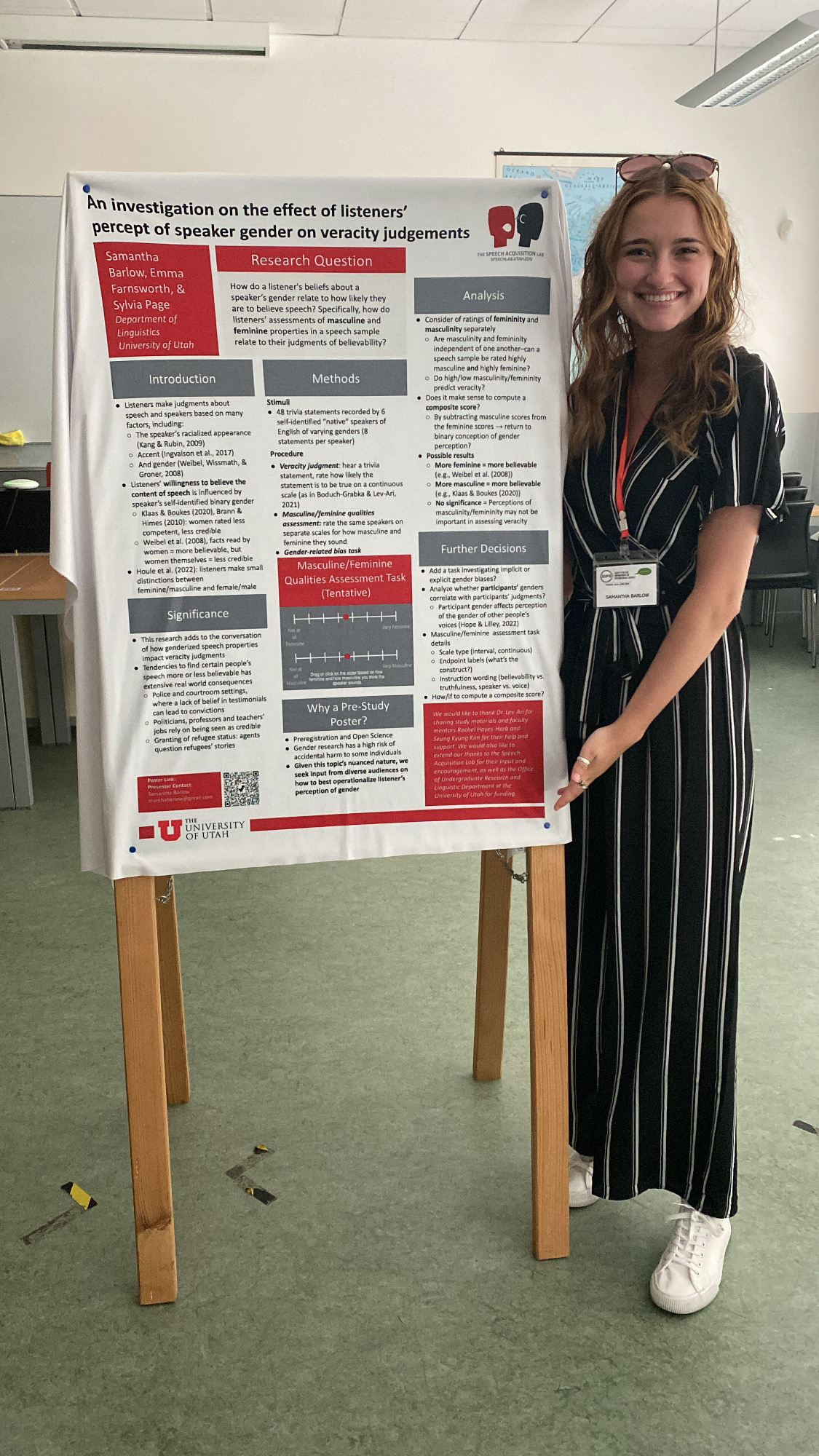Linguistics Undergraduate Students
Publish Article in Prestigious Journal

Samantha Barlow standing next to poster at SIPS
In Fall 2022, Rachel Hayes-Harb, professor of linguistics at the University of Utah, led her capstone students through a large group replication study, which has culminated into an article that appeared in Studies in Second Language Acquisition Journal, in March 2024. Titled, “The effects of exposure and explicit stereotypes on veracity judgments of Polish-accented English speech: A preregistered close replication and extension of Boduch-Grabka & Lev-Ari,” the article aims to investigate the problematized subject of accented speech.
As part of the capstone course, 20 students worked together with Hayes-Harb, Emma Farnsworth, post-baccalaureate teaching assistant, and Seung Kyung Kim, assistant professor of linguistics. Based on their research interests, students were divided into teams such as project management, data collection, writing, and open science, which focused on the transparency and conduction of responsible research. The entire study was conducted within a single semester and those who wished to continue with the publication process were offered the opportunity to stay on the project to help with the publication process.
“Most of the students had never conducted research before so it was largely collaborative as we explored the nuances and rules of replication,” said Samantha Barlow, who participated in the research. “I think the most important takeaway from this article is that none of it would have been possible without each and every collaborator. Collaborating in such an open and honest group only helped our group succeed further than we ever could have imagined, leading us to publish in a highly recognized linguistic journal, as undergraduates.”
The goal of the article was to replicate a study conducted by Boduch-Grabka & Lev-Ari (2021), which concluded that “native” British-English speakers judged statements produced by Polish-accented English speakers as less likely to be true than statements produced by “native” English speakers. The class tested the believability of true or false (veracity) statements using British-accented and Polish-accented speech. The main hypothesis was that if given prior exposure to the unfamiliar Polish-accented speech, participants would be more likely to judge the statements as believable. The class also extended the study by conducting an explicit bias task towards Polish migrants in the UK – meaning this task focused on stereotypical beliefs of Polish migrants in order to observe whether personal beliefs of other groups affected their believability results. The article concludes that the team was unable to replicate the previous study’s findings but that the extension of the explicit bias task did yield semi-significant results in certain categories. The students, therefore discuss other explanations for the lack of replication and possible future directions for this work.
Some of the students had the opportunity to present their work at the Pronunciation in Second Language Learning and Teaching conference at Purdue University in Fall 2023 and a student-led follow-up study was presented at the Society for the Improvement of Psychological Science, University of Padua (Italy) in June 2023.
“Presenting this article was an invaluable experience for my academic career,” said Barlow.
Excited for the opportunity to present the research, Barlow applied and received travel grants through the Department of Linguistics and the Office of Undergraduate Research to help fund her travel and accommodations, so she could attend the conference.
“I created an academic poster to present and had the pleasure of being part of a poster cohort presenting their research. I was able to get feedback and connect with other linguistic researchers in the community. At first it was an intimidating task to talk to well-established linguists about the first study I had ever helped conduct, but once I started presenting it was clear that we all had the same passion for linguistics and simply wanted to collaborate to further our field,” said Barlow.
In addition to presenting, Barlow was also able to attend other researchers’ talks and learn about their studies, which helped her expand her own research interests. Hayes-Harb also attended the conference and introduced Barlow, and other undergraduate researchers from the U to her colleagues, which helped them network and discuss future directions within the field of linguistics.
“Presenting the article on behalf of all the other authors and the U was such a gratifying experience and one I will never forget. I truly believe presenting at a conference where everyone is interested in the same progression and expansion within your field is something anyone interested in research, whether it is linguistics or otherwise, should experience,” said Barlow.
Journal authors: Samantha Barlow, Greg Beardsley, Zeta Bsharah, Robin Crofts, Carlos De La Rosa, Andrea Guttierrez, Carlie Highfill, Amy Gail Wade Johnson, Caroline Johnson, Jacob Johnson, Isaac Leyva Cardenas, Jordan Taylor Martinez, Nathaniel Todd Miller, Riley Monroe Murray, Sylvia Page, Taylor Petersen, Irina Ramos. Rayvin Rhodes, Phoebe Vainuku, Brenan M. Wednesday, Emma Corrine Farnsworth, Seung Kyung Kim, and Rachel Hayes-Harb.
MEDIA CONTACTS
Jana Cunningham, University of Utah College of Humanities
Published April 16, 2024
